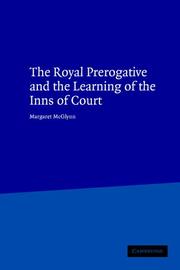| Listing 1 - 2 of 2 |
Sort by
|

ISBN: 0521804299 0521187699 1107131006 0511179987 0511063709 0511306865 0511495420 1280419075 0511203969 0511072163 9780511063701 9780511179983 9780511072161 9780511495427 9780521804295 9780521187695 Year: 2003 Publisher: Cambridge : Cambridge University Press,
Abstract | Keywords | Export | Availability | Bookmark
 Loading...
Loading...Choose an application
- Reference Manager
- EndNote
- RefWorks (Direct export to RefWorks)
Between the mid-fifteenth and mid-sixteenth century Prerogativa Regis, a central text of fiscal feudalism, was introduced into the curriculum of the Inns of Court, developed, and then abandoned. This 2003 book argues that while lawyers often turned their attention to the text when political and financial issues brought it to the fore, they sought to maintain an intellectual consistency and coherence in the law. Discussions of both substance and procedure demonstrate how readers reflected the concerns of their time in the topics they chose to consider and how they drew on the learning of both their predecessors and their peers at the Inns. The first study based primarily on readings, this book threw light on legal education, early Tudor financial and administrative procedure, and the relationship between the ways that law was made, taught and used.
Prerogative, Royal --- Feudal law --- Inns of Court --- History --- Royal prerogative --- Court, Inns of --- Droit féodal --- Feudalism --- Law, Feudal --- Law --- Executive power --- Monarchy --- Divine right of kings --- Regalia --- Bar associations --- Land tenure --- Law and legislation --- General and Others --- Inns of Court. --- History. --- Inns of Court School of Law
Book
ISBN: 1487537441 1487537433 Year: 2021 Publisher: Toronto, Ontario : University of Toronto Press,
Abstract | Keywords | Export | Availability | Bookmark
 Loading...
Loading...Choose an application
- Reference Manager
- EndNote
- RefWorks (Direct export to RefWorks)
"The sixteenth century was a turning point for both law and drama. Relentless professionalization of the common law set off a cascade of lawyerly self-fashioning - resulting in blunt attacks on lay judgment. English playwrights, including Shakespeare, resisted the forces of legal professionalization by casting legal expertise as a detriment to moral feeling. They celebrated the ability of individuals, guided by conscience and working alongside members of their community, to restore justice. Playwrights used the participatory nature of drama to deepen public understanding of and respect for communal justice. In plays such as King Lear and Macbeth, lay people accomplish the work of magistracy: conscience structures legal judgment, neighbourly care shapes the coroner's inquest, and communal emotions give meaning to confession and repentance. An original and deeply sourced study of early modern literature and law, Communal Justice in Shakespeare's England contributes to a growing body of scholarship devoted to the study of how drama creates and sustains community. Penelope Geng brings together a wealth of imaginative and documentary archives - including plays, sermons, conscience literature, Protestant hagiographies, legal manuals, and medieval and early modern chronicles - proving that literature never simply reacts to legal events but always actively invents legal questions, establishes legal expectations, and shapes legal norms."--
English drama --- Justice in literature. --- Justice, Administration of, in literature. --- Law enforcement in literature. --- Law in literature. --- Law --- Lawyers in literature. --- History and criticism. --- History andcriticism. --- History --- Shakespeare, William, --- Criticism and interpretation. --- 1500-1600 --- Great Britain. --- England. --- English common law. --- King Lear. --- Macbeth. --- Protestant Reformation. --- Shakespeare and law. --- Shakespeare. --- communal justice. --- conscience. --- domestic tragedy. --- inns of court. --- law and emotion. --- law and literature.
| Listing 1 - 2 of 2 |
Sort by
|

 Search
Search Feedback
Feedback About
About Help
Help News
News